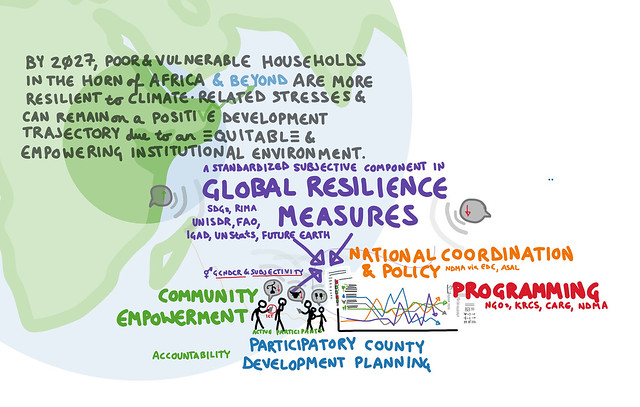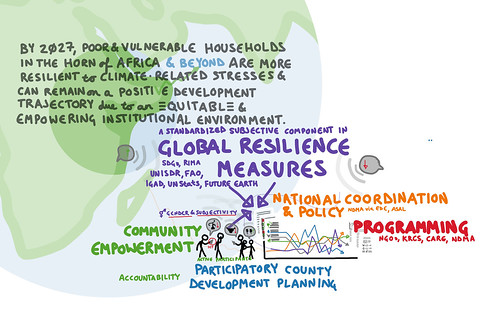Originally posted on the Aspiration blog
At the end of April I was in Nairobi doing several things related to digital humanitarian response. One of these was a program called Dialling Up Resilience (yes, with two Ls in “Dialling,” because it was a British-centred team), which looks at local indicators of resilience. This blog entry explores why subjectivity is important in measurement, and how technology can help us parse through subjective information and combine it with objective datasets.
Scarcity
It’s possible to exacerbate or alleviate existing inequalities when designing and implementing response programs. As climate change alters the world around us, the people who have been historically marginalized often become even more so as those in power see scarcity encroaching on their livelihoods. When programs distribute resources without taking care with those previously in power, we also see backlashes and resource grabs. But the ability to hold people accountable in new ways through things like social media and community mapping are coupled with an awareness and effort towards the long bend towards justice means there are groups of people seeking new ways to better allocate resources to those most affected by those inequalities. Often, the groups working in this space are also in a post-scarcity mentality — that, when we work together wisely, we can do a whole lot more with a whole lot less. These are folk who think we can reach zero poverty and zero emissions (within a generation). These are the folk who see joy in the world, and possibility in these difficult situations we’ve backed ourselves into.
Resource Allocation
The resource allocation and accountability necessary for transitory steps towards a world that can survive and even thrive won’t happen in a vacuum. The formal and informal organizations of this space alike have entire supply chains, ways of listening (and to whom), and self-reflexive mechanisms to consider. In these are embedded corruption, paternalism, and colonialism. But also in these are embedded individuals who have been Fighting The Good Fight for decades, and have added useful checks, amplifiers, and questions into infrastructure. It’s into this environment we step when we do response work. It is, at its core, like any other environment — it has History.

It’s in this context that Dialling Up Resilience is such a good program. This project supports the need to adapt to climate issues while putting frontline communities at its core, and does so in a way which can be useful in historically convoluted contexts.
Metrics
When various organizations — be they international or local, government mandated or radical, formal or informal — wish to change a circumstance, having metrics can help show if success is being approximated. Hopefully, those metrics can also hint at where and how we’re failing. To adapt to climate change and other issues, we need to be able to see how initiatives are doing over time. We can then better allocate resources or attention. The way this is done now is primarily through “objective” measurements such as education level and income. These don’t work for everyone, whether because they are pastoralists or anti-capitalists (or both). In the same way that some schools shift away from standardized testing into more subjective ways to measure learning, Dialling Up Resilience re-focuses the evaluation of success more locally. This is how the frontline community is at the core — they’re determining what makes them resilient, as well as how they feel they’re doing in relationship to those self-defined indicators.
These metrics are then visible to the community (often we’re our own calvary, afterall), and the aggregate is visible to organizations acting in the area. What are needs they may have missed? Is a program having the desired impact? Because of the flow we set up, the information is even fast enough to potentially be for rapid response, with people in a region indicating a flood-related need then triggering alerts for response organizations to deploy those materials in time.
Working with Existing Communities and Initiatives
We worked with a few different groups directly working in Kenya, including the National Drought Management Authority (and their Ending Drought Emergencies program) and UNDP on their existing surveying initiatives and Climate Change, Agriculture and Food Security, as well as extending those survey abilities with international groups like GeoPoll (SMS), Taweza (call center), and Kobo (household) to assess how communities establish and track their own resilience. While we didn’t get the second round of funding, we hope in future to also work more directly with communities using tools like Promise Tracker and Landscape (a digitized version of Dividers & Connectors) to better expose a community’s data back to themselves, and to subsequently be able to have more agency over their own improvement as well as accountability.
What’s also exciting is that our means and our ends matched. I was again in Nairobi for a stakeholder workshop with not only the project partners, but also with the organizations which would eventually make use of the data. We conducted community workshops to test our basic assumptions and methods against reality, as well as to be sure community voice was at the core of each component we consider. We threw a lot out… and added some amazing new things in. We hoped to break down the gatekeeper dynamic of accessing communities in the Horn of Africa, and we wanted to be coextensive with existing programs (rather than supplanting them). It’s feminist and it’s development and I’m kind of super thrilled that we got to try this idea out, even if we don’t get to do it in earnest (yet). We’ll keep looking for opportunities to carry the idea forward, and the design principles will remain at the core of what we do. You can read more about the proposal and stakeholder workshop here, including that side comment about feminism around page 7.

